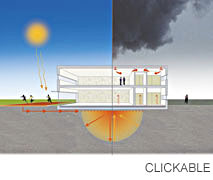ICAX speaks at M&E - Building Services Event 2012 London Olympia 10-11 October
ICAX has been invited to explain how Interseasonal Heat Transfer can help you address the key issue of combating global warming in a practical way that is in tune with the natural environment.
Protecting and enhancing the environment sits at the heart of sustainability. With the growing awareness that the built environment accounts for nearly half of the UK’s CO2 emissions; innovative, green solutions for designing, constructing and using buildings are in urgent demand.

ICAX answers that demand by providing Interseasonal Heat Transfer which heats buildings in winter without burning fossil fuels by exploiting Ground Source Energy. Surplus solar energy is captured by Asphalt Solar Collectors and stored in ThermalBanks in the summer for release into buildings in winter using a ground source heat pump.
ICAX can help you achieve sustainability in the built environment by storing ground source energy in Thermalbanks.
Edward Thompson is speaking at M&E - Building Services Event 2012 on:
Integrating solar thermal collection & seasonal heat storage to improve ground source heat pump efficiency. The range of subjects covered by the speakers will include:
- Microgeneration
- Combining renewables with energy management
- Ground source heating and cooling (GSHC)
- The true cost of on-site renewable energy
- Interseasonal Heat Transfer & Intrabuilding Heat Transfer
- Renewable Energy Strategies for UK businesses
- Assessing the UK’s renewable energy options
- Understanding Feed-In TariffsFiTs
- Solar thermal energy - a focus on innovation
- Concentrated solar power (CSP) technology
- Renewable Heat Incentive (RHI)
- Retrofitting renewables
- Photovoltaics, Wind, Bioenergy
M&E - Building Services Event 2012 is the UK’s largest building services event. Learn more or register at Building Services Event.
Ground Source Energy
Ground source energy is a renewable source of energy which can be used for heating buildings. Architects, consultants and building owners have realised that ground source energy can be exploited the whole year round to provide significant reductions in carbon dioxide emissions and heating and cooling costs.
Heat can extracted from the ground via fluid circulating through an array of pipes in the ground to provide heating to buildings in winter. The ground acts as a "heat source". The ground can also be used as a "heat sink" for heat extracted from a building in summer in order to provide cooling. For the ground to be used as a ThermalBank in this way it is necessary to ensure that there is a balance of heat extracted and heat deposited in the ground over the course of the year.
Thermal Modelling of the complete system is necessary to ensure that this balance is achieved in a sustainable way over the years. If heat is extracted for space heating purposes without any heat being deposited (from cooling the building in summer) there is a risk that the ground temperature will fall each year and the heat pump will cease to be efficient – it may even "lock up". The solution is to collect solar energy in the summer and transfer heat to the ground in advance of the heating season: this is the essence of Interseasonal Heat Transfer and enables the heat pumps in an ICAX Skid to extract heat more cheaply and more efficiently than in an unassisted heat pump installation.
Heat collection for Ground Source Energy
Surplus solar energy can be collected in summer to boost ground source energy in winter by using Asphalt Solar Collectors, Solardec Watertight Collectors or standard solar thermal collectors. The asphalt solar collectors and Solardec can also be used as heat rejectors to disperse heat in systems of Natural Cooling. The most effective combination is found in Interseasonal Heat Transfer which utilises ground source heating and cooling in one integrated system.
Heat distribution from Ground Source Energy
Having extracted heat from the ground using a heat pump, there are various different mechanisms for distributing heat within a building. Because a heat pump is most efficient when delivering warmth – at around 40°C – instead of heat – at around 70°C, it is best to use a distribution system that matches these lower output temperatures. Underfloor heating is ideal, but other options like TermoDeck and VRF fan coil units can also be very effective, as can direct supply to air handling systems.
M&E - Building Services Event 2012 is being held in conjunction with Energy Solutions 2012.
See Ground Source Heating See Ground Source Cooling Ground Source Energy



